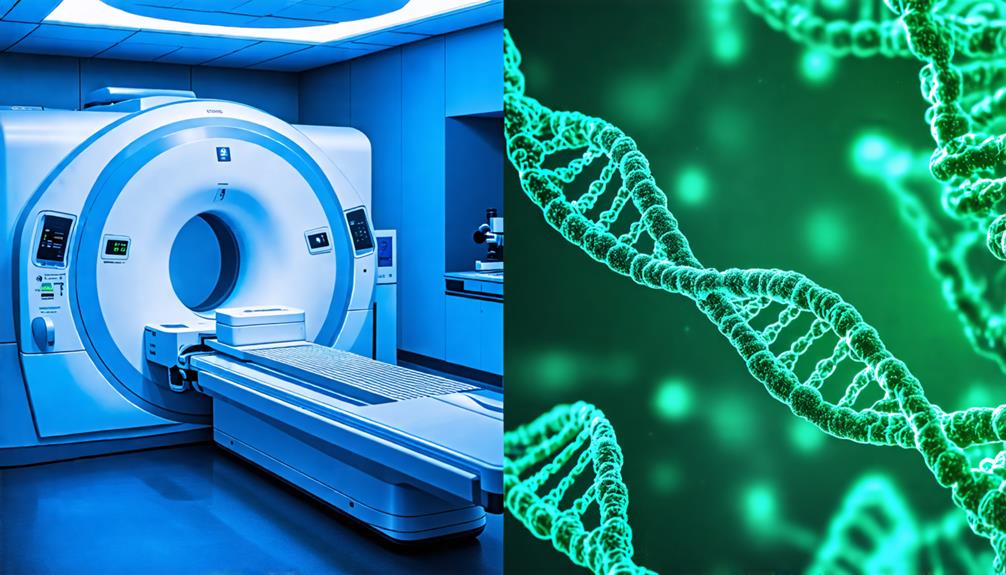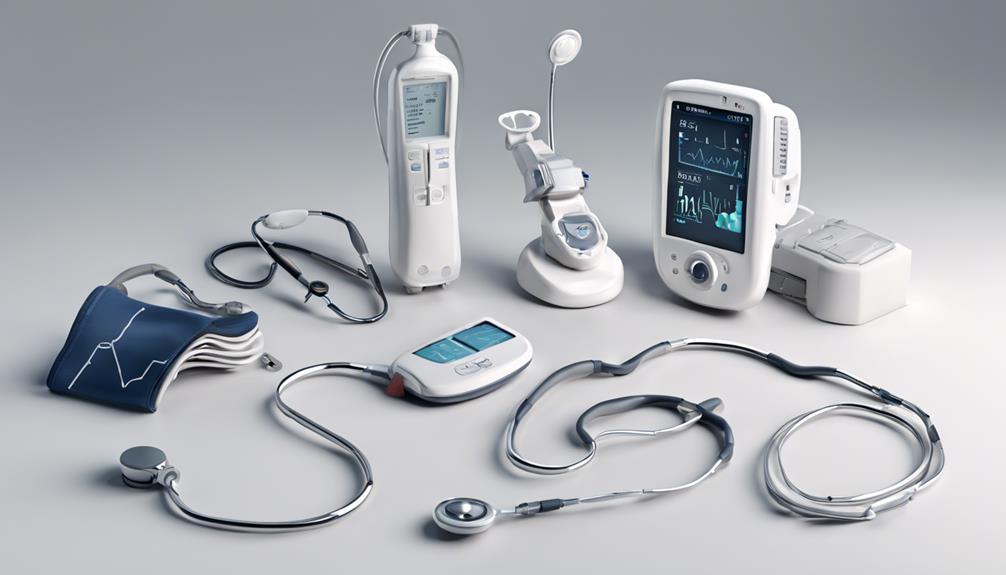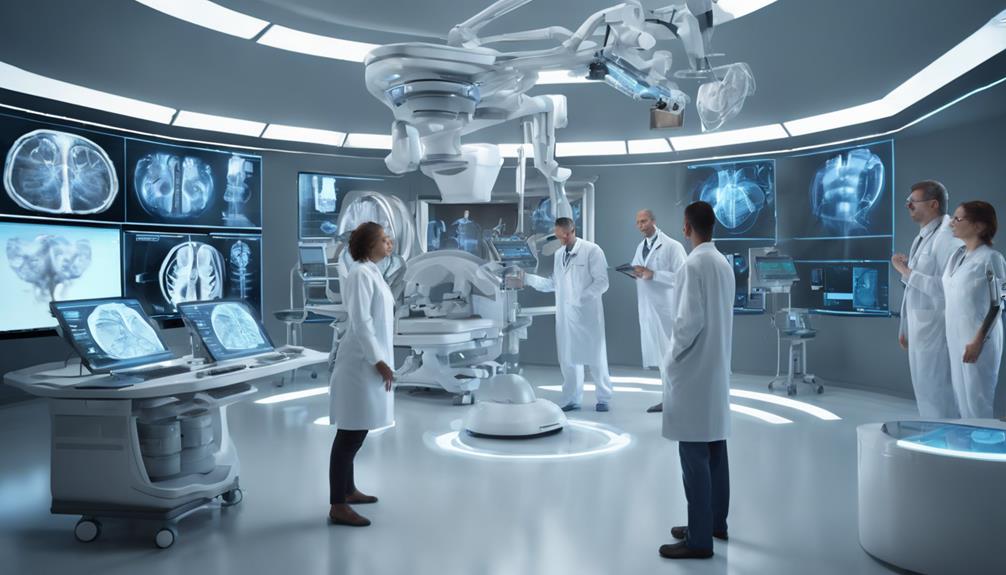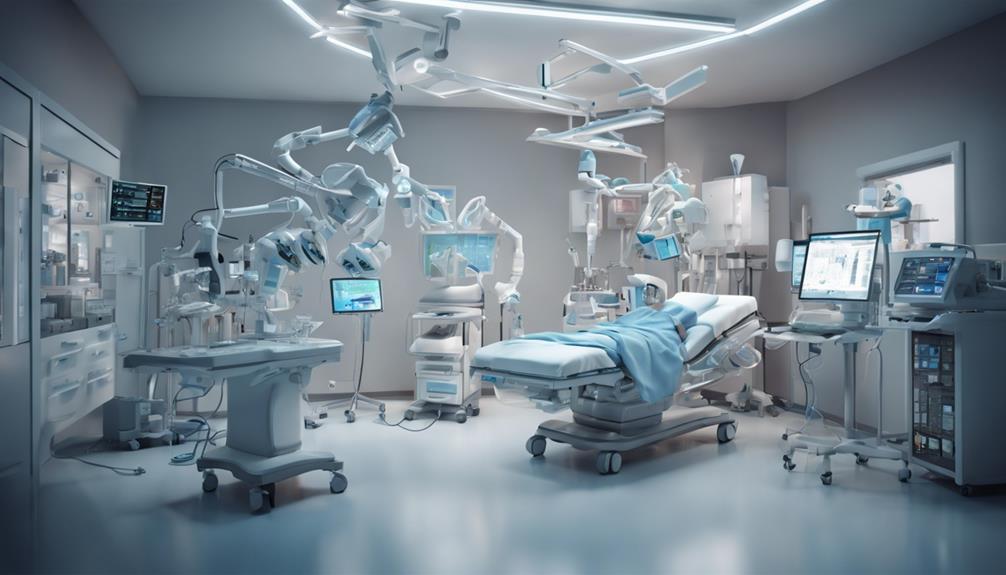
Medtech and biotech might seem similar, but they serve different purposes in the healthcare world. Medtech, or medical technology, includes products and services like MRI machines and surgical robots that diagnose, monitor, and treat medical conditions. On the other hand, biotech involves manipulating biological processes to develop products like pharmaceuticals and vaccines, focusing on innovative treatments and sustainable solutions. While medtech advances the tools and technologies used in medicine, biotech revolutionizes the treatments themselves through biological advances. Exploring further will show you how both fields are integral to shaping the future of healthcare.
Defining Medtech

Medtech, short for medical technology, encompasses a wide range of healthcare products, services, and solutions used to treat, diagnose, or prevent medical conditions and diseases. You're likely already familiar with many medtech innovations, even if you don't realize it. From MRI machines that scan your body for abnormalities to the tiny glucose monitors that diabetics use daily, medtech is integral to modern healthcare.
It's not just about the devices, though. Medtech also includes the software and IT systems that manage medical information, monitor health data, and support clinical operations. For instance, when you visit a doctor, the electronic health record that they rely on to review your medical history is a piece of medtech. These technologies streamline processes, improve patient outcomes, and increase the efficiency of healthcare delivery.
Moreover, medtech plays a crucial role in developing minimally invasive surgical technologies, which allow you to recover faster and with less pain compared to traditional surgery. These advancements not only improve your quality of life but also reduce hospital stays and healthcare costs.
As you navigate the complex world of healthcare, understanding medtech's scope and impact helps you appreciate the innovations that maintain and enhance human health.
Understanding Biotech
Exploring biotechnology, you'll find it's a field that manipulates biological processes to develop products and technologies that enhance our lives and the health of our planet. Biotech harnesses cellular and biomolecular processes to create solutions that can lead to groundbreaking drugs, eco-friendly chemicals, and improved crop yields.
You might be surprised to learn how deeply biotech is woven into everyday life. From the food you eat to the medicines in your cabinet, biotechnology influences various facets of human and environmental health. It's not just about genetically modified organisms (GMOs); it's also about developing new vaccines, innovative therapies for treating illnesses, and biodegradable plastics that reduce waste.
Biotech companies are at the forefront of medical research, focusing on personalized medicine. This approach tailors treatments to your genetic makeup, optimizing therapeutic effectiveness and minimizing side effects. Additionally, biotech research extends to regenerative medicine, including tissue engineering and stem cell research, which aims to restore or establish normal function in damaged tissues and organs.
As you dive deeper into this field, you'll appreciate the scope and impact of biotech. It's a sector driven by innovation, where biology meets technology to solve complex problems.
Key Technologies in Medtech

Now let's explore the key technologies in medtech that are revolutionizing healthcare.
You'll find that wearable devices have surged in popularity, giving you the power to monitor your health metrics in real-time. Smartwatches and fitness trackers measure heart rate, sleep patterns, and even blood oxygen levels, providing data that can predict health trends and prevent illnesses.
Telemedicine platforms are another game changer. They allow you to consult with doctors remotely, which is crucial in rural areas or when you can't leave home. This tech ensures that you receive timely medical advice without the need to travel, making healthcare more accessible and efficient.
Robotics in surgery is also transforming the field. These robots assist surgeons in performing precise and minimally invasive procedures, reducing recovery time and improving surgical outcomes. You might be amazed at how this technology minimizes human error and enhances the surgeon's capabilities.
Innovations in Biotech
As we delve into biotech, you'll discover groundbreaking innovations that are transforming the landscape of medicine and environmental management. One of the most exciting advances is CRISPR technology. It's not just about editing genes to prevent diseases; scientists are now using it to create more sustainable crops and address critical shortages in our food supply.
Imagine rice that can grow with less water or wheat that can thrive in harsh climates. That's the potential of biotech!
Additionally, biotech is revolutionizing materials science. Researchers have developed biodegradable plastics derived from plant materials, which decompose much faster than traditional plastics. These bioplastics aren't just good for the environment; they're paving the way for more sustainable packaging solutions across industries.
Biotech is also making strides in biofuel production. By modifying algae and other organisms, scientists are producing biofuels that burn cleaner than fossil fuels, which could greatly reduce greenhouse gas emissions.
This isn't just a win for the environment but also for energy sustainability on a global scale.
You'll find that these biotech innovations don't just promise a healthier planet but also a sustainable future, showing that the field holds much more than medical applications alone.
Impact on Healthcare Industry

Biotech innovations are revolutionizing the healthcare industry by enhancing disease diagnosis and treatment options. You're seeing groundbreaking advancements that are directly impacting patient care quality. From personalized medicine to genome sequencing, biotech is paving the way for more precise and effective treatments. These technologies allow doctors to tailor treatments specifically to your genetic makeup, reducing guesswork and enhancing treatment efficacy.
Moreover, biotech developments are crucial in developing vaccines and therapies for complex diseases. You've probably noticed faster vaccine development cycles recently, which are a direct result of sophisticated biotech tools. This rapid response capability is transforming public health responses to epidemics and pandemics, ensuring you and your community are better protected against emerging health threats.
Biotech is also advancing regenerative medicine, including tissue engineering and stem cell research, which can potentially restore function to damaged tissues and organs. Imagine suffering from a condition that was once deemed irreversible, and now, thanks to biotech, you have hope for recovery and a better quality of life.
These technological strides aren't just about curing diseases; they're about enhancing your everyday health management. Biotech's integration with digital tools helps monitor and manage chronic conditions more seamlessly, making healthcare more proactive and less reactive in your life.
Future Trends and Predictions
Looking ahead, you'll likely witness even more transformative biotech innovations that could redefine healthcare norms and practices. As you navigate this evolving field, expect to see groundbreaking developments in gene editing technologies like CRISPR, which could drastically improve genetic disorders treatment by making it more precise and accessible.
Advances in bioprinting are also on the horizon, paving the way for you to see the creation of complex tissue structures that could lead to organ regeneration.
On the medtech front, you'll see an expansion in the integration of artificial intelligence and machine learning into diagnostic and treatment processes. This integration won't only enhance the speed but also the accuracy of medical diagnostics, making personalized medicine more of a reality for you.
Wearable health technology will continue to evolve, providing you with real-time health monitoring that could predict potential health issues before they become evident.
Furthermore, both sectors are likely to converge more significantly, offering you holistic solutions that combine the strengths of biotechnology and medical technology. This synergy will aim to deliver more comprehensive and efficient healthcare solutions, directly impacting how you manage your health in the future.
Frequently Asked Questions
How Do Medtech and Biotech Investments Compare in Terms of Roi?
You're wondering about ROI in medtech vs. biotech investments. Generally, biotech offers potentially higher returns due to groundbreaking innovations, but it's riskier. Medtech can be more stable, with steady, long-term growth.
What Are Common Career Paths Within Medtech and Biotech Sectors?
You can pursue careers in research, development, or management in both sectors. Medtech often leads to roles in medical device engineering, while biotech frequently offers paths in pharmaceuticals and genetic research.
Can Medtech Solutions Integrate Seamlessly With Existing Biotech Products?
Yes, you can integrate medtech solutions with existing biotech products, but it depends on compatibility, regulatory approval, and the specific technologies involved. It's key to align their functions and ensure seamless operation.
What Ethical Considerations Are Unique to Biotech Compared to Medtech?
You need to consider how biotech's genetic modifications impact biodiversity and consent issues, which differ from medtech's focus primarily on medical devices and patient-specific ethical concerns like privacy and data security.
How Do Regulatory Processes Differ Between Medtech and Biotech Industries?
You'll find that medtech's regulatory processes often focus on device safety and performance, while biotech's involve rigorous scrutiny of biological products' effects and interactions, reflecting their differing impacts on health.
Conclusion
You've seen how medtech and biotech are revolutionizing healthcare, each in its unique way. Medtech's devices and software enhance medical procedures and patient care, while biotech's cellular and biomolecular processes innovate drug development and therapies.
Together, they're setting the stage for groundbreaking advancements. As these fields evolve, expect smarter technologies and more personalized treatments that significantly improve health outcomes.
Stay tuned; the future of healthcare looks promising thanks to these technological wonders.






